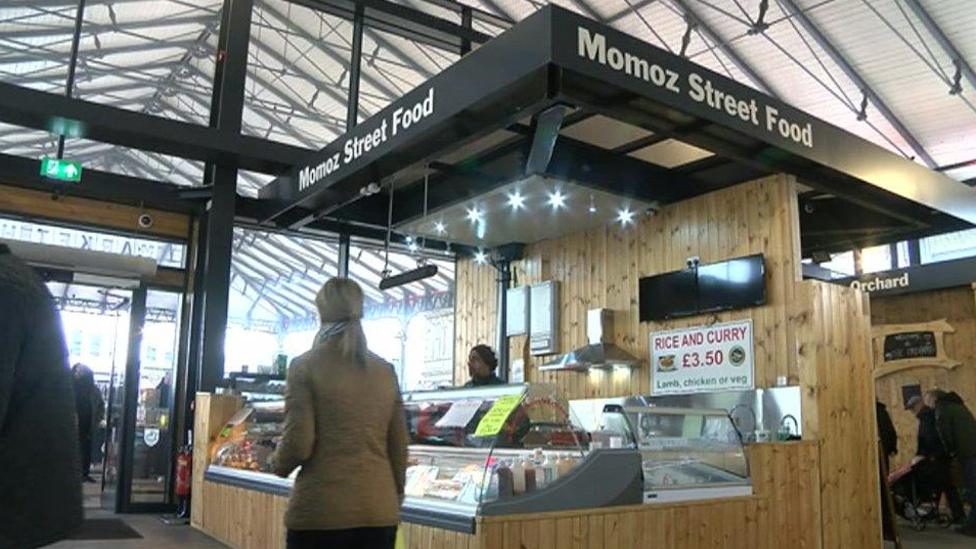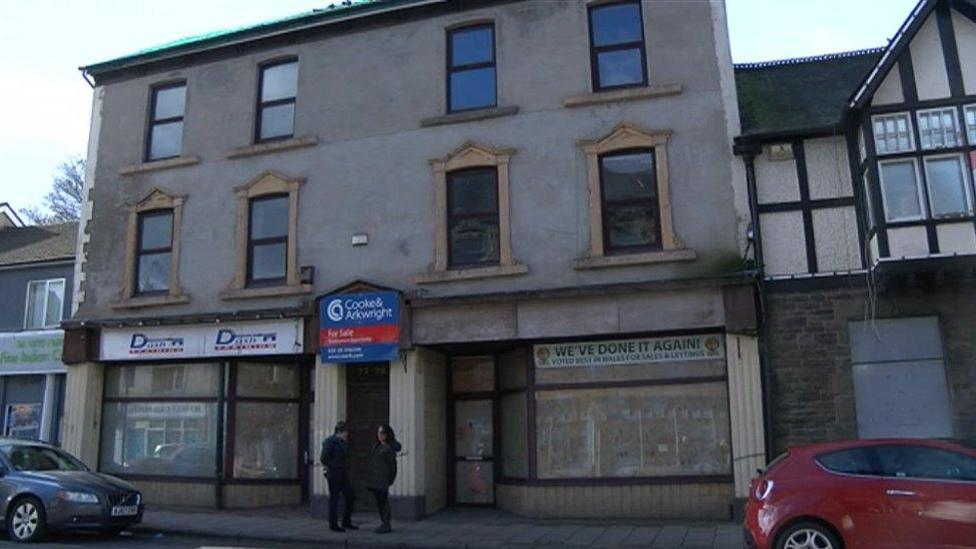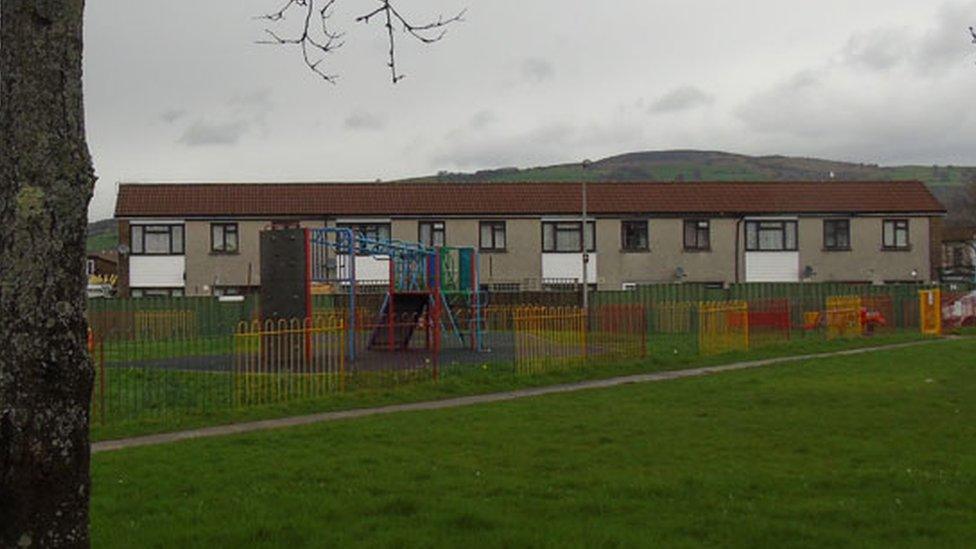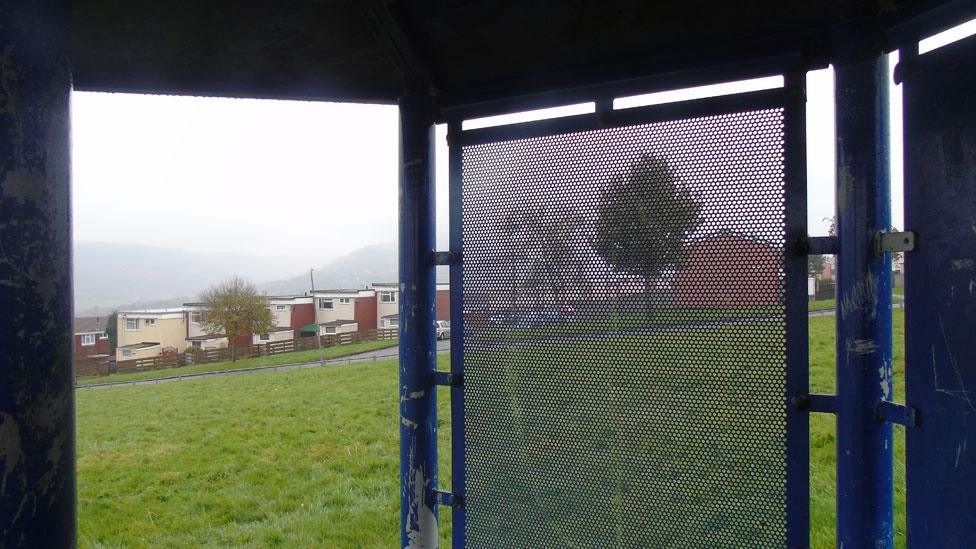Public bodies in Wales urged to 'think local'
- Published
- comments

Hospitals, schools, councils and other public sector bodies are being encouraged to come up with the best ways of spending more in local communities.
A pot of £1.5m for the most innovative ideas has been set up by the Welsh Government.
The aim is to develop more locally-based jobs and businesses.
It marks a shift from the emphasis on grants to big corporations and foreign firms to move into Wales.
The deputy economy minister has been looking at Preston, which in turn took its ideas on how to spend public money differently from Cleveland, Ohio. , external
"We can talk about grants coming in, we can talk about inward investment, but it doesn't affect communities like this - Llanelli - which are left behind and beyond the tools of traditional economic development," said Lee Waters, deputy minister and Llanelli AM.
"We need to respond to that and give people a say, so the fabric of their lived lives can be improved by government. We have failed to get that message across so we need to do things differently."

Lessons from Preston
Preston is a city about the size of Swansea. It used to be one of the most deprived in the UK but now it is climbing the league tables.
Business consultants PWC recently named Preston as the most improved city in the UK between 2015 and 2017, scoring highly for better employment - there are 14,000 more jobs - skills, transport and work-life balance.
Preston council leader Matthew Brown said: "We needed to do something new, things weren't working.
"We're really trying to make sure every pound we spend is kept within the Preston economy and benefits people and benefits companies who are going to remain in Preston, as much as legally possible."
Mr Brown said 63p in the pound was staying in the local economy - amounting to an increase of £75m over five years - but when contracts go to outside companies, that figure shrinks to 40p in the pound.
Local builders and food producers have all benefited with wealth "spread around" and it is claimed it is no more expensive to use local suppliers.
No-one is complacent. Wages in Preston are improving but are still about 15% lower than the UK average.

A new market hall was designed locally
There are also boarded up shops alongside the stylish, revamped market hall.
Locally-based architects Frank Whittle Partnership designed the new building.
The city had been stung after the failure of a planned £700m retail development a few years before.
"Ten years ago, nobody local got a look in but since the credit crunch, the local authority and university have become more inclusive in using local businesses," said David Robinson, managing partner.
"You have to look after people in your locality but they have to have the expertise. We know the city, it's that local knowledge and we understand their concerns."
Could it work in Morriston?

Coastal has taken over this empty building and aims to encourage start-up businesses
In the same PWC study, Swansea was ranked worst alongside Sunderland in the "good growth index",, external with low performance particularly for income, health, new business and the environment.
But in the city's Morriston district - with a population of 16,500 - there are moves to see whether public money could be spent more locally.
The DVLA and the local hospital are both large employers but could they and their staff be encouraged to use local businesses more?
Coastal housing association already uses local builders and suppliers.
"We buy about 80 or 90% of our stuff locally, it might take a bit of work at the beginning but you find you have local suppliers who understand your needs better," said chief executive Debbie Green.
"We also find it's better to build up a skills base with local employers - they're not going away and we're not going away."
Deputy economy minister Lee Waters says spending needs to be smarter
Welsh Government policy already attempts to encourage organisations to use local employees and suppliers as much as possible, but it is moving towards encouraging public bodies to work with others to see what opportunities there are to grow the amount they spend locally.
With austerity still having a tight hold on public sector budgets and communities struggling, the Welsh Government wants to ensure the money that is spent can have more impact.
The gap between the richest parts of Wales - and those struggling - has widened. Experts have been arguing that more needs to be done to help at grassroots levels and there should be more focus on supporting jobs in care work, with local building firms and in food production.
The Welsh Government isn't tearing up the way it has tried to attract new jobs for decades - grants and loans to expand a workforce.
But this is a significant step - a toe in the water - in terms of trying to persuade public organisations to use the money they have, to create the biggest impact they can in the communities they operate in.
- Published7 March 2018

- Published13 April 2017

- Published27 October 2016
